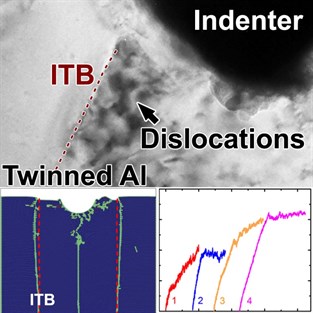A research group led by Dr. Xinghang Zhang, associate professor and the Gulf Oil/Thomas A. Dietz Career Development Professor I in the Department of Mechanical Engineering at Texas A&M University, has discovered plasticity and work-hardening behaviors in twinned aluminum with incoherent twin boundaries by using in situ nanoindentation technique. The group's paper titled "In situ nanoindentation study on plasticity and work hardening in aluminum with incoherent twin boundaries" was published in Nature Communications 5 on Sept. 10, 2014.

Nanotwinned metals have been the focus of intense research recently, as twin boundaries may greatly enhance mechanical strength, while maintaining good ductility, electrical conductivity, and thermal stability in metallic materials. Most prior studies have focused on low stacking-fault-energy nanotwinned metals with coherent twin boundaries. In contrast, the plasticity of twinned high stacking-fault-energy metals, such as Al with incoherent twin boundaries, is poorly understood.
In their paper, Zhang’s graduate students, Dr. Daniel Bufford and Yue Liu, reported high work hardening capacity and plasticity in highly twinned Al containing abundant S3{112} incoherent twin boundaries based on in situ nanoindentation studies in a transmission electron microscope and corresponding molecular dynamics simulations. The simulations also reveal drastic differences in deformation mechanisms between nanotwinned Cu and twinned Al ascribed to stacking-fault-energy controlled dislocation-incoherent twin boundary interactions. This study provides new insight into incoherent twin boundary-dominated plasticity in high stacking-fault-energy twinned metals.
The co-authors of the paper are Dr. Jian Wang in materials science and technology division at Los Alamos National Laboratory, who performed MD simulations, and Dr. Haiyan Wang in the Department of Electrical Engineering at Texas A&M University, who co-supervised in situ nanoindentation studies. This research is supported by the Office of Naval Research; the U.S. Department of Energy – Office of Science, Office of Basic Energy Science.
Zhang's research group has expertise in nanomechanics in nanolayered and nanotwinned metals, radiation damage, and magnetic shape memory alloys.

Liu is a postdoctoral fellow in Zhang’s group and will be joining the prestigious Los Alamos National Laboratory in fall 2014. He earned a bachelor's degree in electrical engineering at Fudan University in China; and a master's degree in mechanical engineering and a Ph.D. in materials science and engineering at Texas A&M University.

Bufford was a Ph.D. student in Zhang’s group. He received a bachelor's degree in physics at Olin College; and a Ph.D. in materials science and engineering at Texas A&M University. Currently, he is a postdoctoral research associate at Sandia National Laboratories in Albuquerque, N.M.
Contact: Zhang at 979-845-2143 or zhangx@tamu.edu, or Liu at Liu.y0203@gmail.com, or Bufford at dcbuffo@sandia.gov.